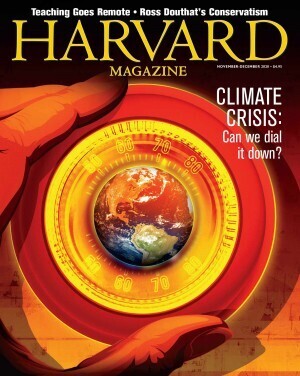 “Climate Crisis: Can We Dial It
Down?,”
the November cover issue of the magazine sent to all of Harvard
University’s thousands of alumni, is yet another in a long
line
of climate-change think pieces by white men interviewing other white
men.
“Climate Crisis: Can We Dial It
Down?,”
the November cover issue of the magazine sent to all of Harvard
University’s thousands of alumni, is yet another in a long
line
of climate-change think pieces by white men interviewing other white
men.
(Understandably, all of the interviewees are professors or alumni of Harvard University.)
The piece, written by managing editor Jonathan Shaw ‘89, hits the traditional technocratic notes with such an approach – a physics-heavy understanding of the enormity of the global crisis, some trenchant words from Bill McKibben questioning neoliberalism, and then several pages of discussion of the potential deployment of new technology, from electric vehicles to direct air capture and solar geoengineering (blotting out the sun with stratospheric pollution to cool the earth).
Nine of the ten interviewees are white men:
- Dan Schrag, director of the Harvard University Center for the Environment
- Bill McKibben, Harvard ’82, journalist and climate activist
- James Stock, professor of political economy
- Richard Zeckhauser, professor of political economy
- Joseph Aldy, professor of the practice of public policy
- David Keith, professor of public policy and applied physics
- Peter Huybers, a professor of earth and planetary sciences and of environmental science and engineering
- Raymond Pierrehumbert, Harvard ’76, professor of physics at Oxford
- Frank Keutsch, professor of engineering and atmospheric science
The tenth, Katharine Mach, Harvard ’04, an associate professor at the University of Miami School of Marine and Atmospheric Science, provides a voice of caution about geoengineering.
Shaw gives the last word to Schrag’s perspective that the catastrophe of man-made global warming may compel the catastrophe of deliberate man-made global cooling. This hubristic logic of destructive escalation has of course led to great tragedy throughout human history. Harvard’s role in one such disaster, the Vietnam War, was detailed in David Halberstam’s “The Best and the Brightest.”
Shaw was not able to incorporate a section on climate refugees into the cover article; the piece appears as a sidebar in the printed magazine. It features his other female interviewee, Jennifer Leaning, professor of the practice of health and human rights at the Harvard T.H. Chan School of Public Health, and associate professor of emergency medicine at Harvard Medical School.
The nine men interviewed are highly intelligent and accomplished men who have dedicated their lives to understanding and combatting the climate crisis. But like all people they do so within the constraints of their skills, experiences, and social position; their numerous commonalities (including those with the author of the piece) lead to a stunted vision of what is at stake and what can be done, let alone what should be done, about the poisoning of our climate system for the profit and power of the few.
An intentional corrective to this bias and limited perspective can be found in the newly published All We Can Save, an anthology of climate essays and poems by 50 racially and geographically diverse women, co-edited by Dr. Ayana Elizabeth Johnson, Harvard ‘02.